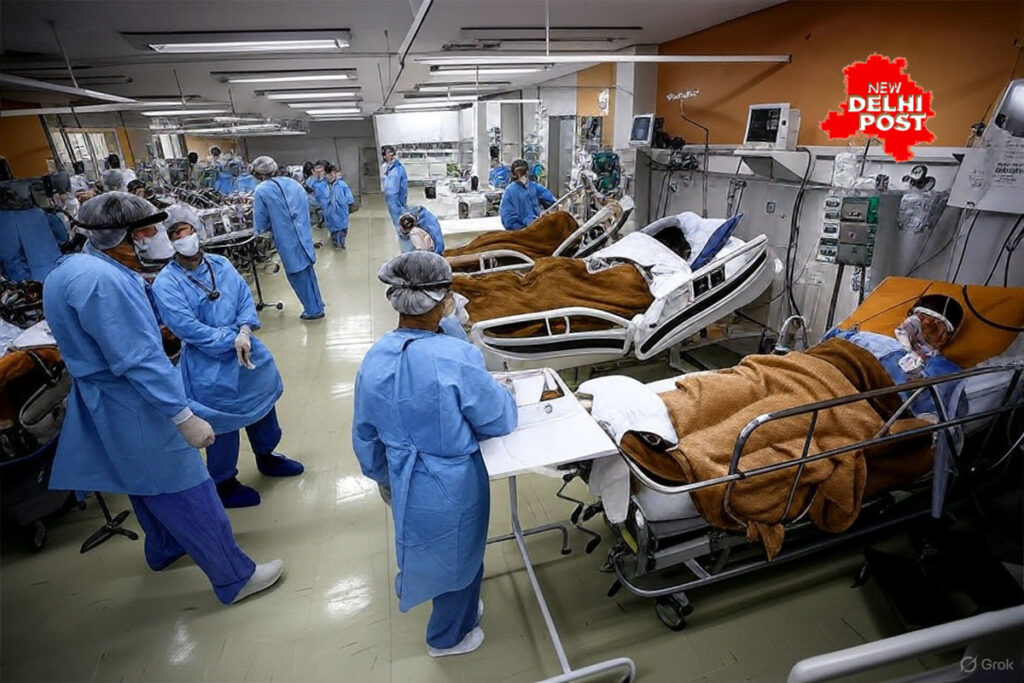Kerala remains the epicenter as active cases soar 20-fold in just 15 days, with 391 new cases reported.
New Delhi: India is witnessing a sharp resurgence of COVID-19, with active cases climbing to 5,755, a 20-fold increase in just 15 days, according to the Ministry of Health and Family Welfare. In the last 24 hours, 391 new cases were reported, 760 people recovered, and four deaths were recorded, underscoring the virus’s persistent threat. Kerala continues to be the hardest-hit state, followed by Gujarat, West Bengal, and Delhi.
Rapid Case Surge and Fatalities
The data reveals a worrying trend, with active cases rising from 257 on May 22 to over 5,700 by June 7, 2025. The four deaths reported in the past 24 hours occurred in Madhya Pradesh, Maharashtra, Kerala, and Tamil Nadu, with victims including a 45-year-old pregnant woman and elderly individuals with comorbidities like hypothyroidism and respiratory issues. Since January 2025, 55 deaths have been linked to COVID-19 nationwide. Kerala alone reported 192 new cases, while Gujarat followed with 107.
State-Wise Breakdown of Active Cases
- Kerala: 1,679 active cases, the highest in the country, with 192 new cases in the last 24 hours. The state has recorded nine deaths this year, second only to Maharashtra.
- Gujarat: 615 active cases, with 107 new infections. The state ranks second in new case numbers.
- West Bengal: 596 active cases, contributing significantly to the national tally.
- Delhi: 592 active cases, with 30 new cases reported. The capital has seen seven deaths since January.
- Maharashtra: 526 active cases, with 10 deaths this year, the highest nationally.
- Other States: Karnataka (436 cases), Tamil Nadu (213), Uttar Pradesh (198), and Rajasthan (103) also report notable case numbers. States like Arunachal Pradesh and Mizoram have zero active cases.
Emerging Variants Fueling the Surge
The spike is attributed to new subvariants, NB.1.8.1 and LF.7, alongside the dominant JN.1 strain, which accounts for 53% of cases. The Indian SARS-CoV-2 Genomics Consortium (INSACOG) detected NB.1.8.1 in Tamil Nadu and LF.7 in Gujarat. While these variants are under WHO’s “Variants Under Monitoring” category and not deemed highly severe, their higher transmissibility is driving infections. Symptoms remain mild, often mimicking the common cold, including fever, fatigue, and sore throat, but experts warn against complacency.
Health Authorities Respond
The Union Health Ministry has issued advisories urging states to bolster healthcare infrastructure, ensure oxygen and medication supplies, and conduct mock drills to assess hospital preparedness. Karnataka has introduced COVID-19 guidelines for schools, mandating that symptomatic children stay home. Health experts emphasize testing to distinguish COVID-19 from other viral infections and recommend masks in crowded areas, especially for vulnerable groups like the elderly and those with comorbidities.
Public Sentiment and Expert Warnings
Posts on X reflect growing concern, with users noting the rapid case rise and urging vigilance. “India’s COVID cases are climbing fast—5,755 active cases now. Time to mask up again?” one user wrote. Experts like Dr. Randeep Guleria, former AIIMS director, stress that while the situation is not yet alarming, timely testing and vaccination updates are critical. The WHO reports that NB.1.8.1 constitutes 10% of global cases, with no evidence of severe outcomes, but undetected spread remains a risk.


